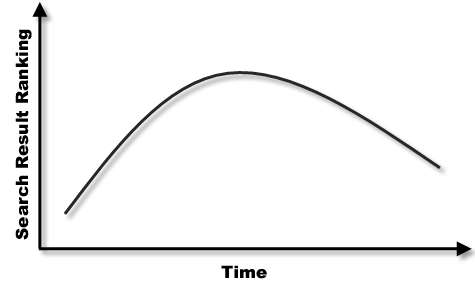As search engine ranking algorithms evolve over the years, different factors gain or lose importance over time. This makes maintaining your ranking a very active process. As search engines evolve, your techniques change to keep up.
As I prepare an Internet business course, I am performing research and discovering new techniques and ideas. As I look at my own site data, I see a new trend on Google which I call Page Velocity. I believe this is not a new SEO factor, but instead a combination of factors that will affect search rankings for some sites.
Page Velocity is the elevated ranking of fresh content based on the number and frequency of high quality incoming links created and social media mentions, for a given period of time after the page is launched. Velocity: how fast does this page become popular after initial launch. This is a short term effect to elevate some pages. If the page does not continue with momentum, it will drop in the rankings. However, as with any page, if you continue link building and other SEO tactics, your page will continue to do well in the rankings.
My theory is Page Velocity affects new content on sites that have a high trust ranking in Google. This allows new pages to be ranked higher initially for a given search term. The theory is supported by Google’s desire to provide much faster page indexing and provide faster access to fresh content. I used to live by a rule that it took 6 weeks to see new pages gain traction on Google. Now, on some sites I am seeing same day indexing and ranking. Other, smaller sites, do not see this rapid ranking leading me to believe it’s based on a variable such as TrustRank.
What does this mean to you?
We’ve known for a long time that link building is the key to good search engine rankings. Now, you may see initial strong results in rankings which seem to inexplicably drop off. Continued focus on SEO tactics may result in a continued high ranking, but you should be aware of the potential of Page Velocity and an initial burst of traffic. Make sure the page is finished at launch – this may be the only impression you get a chance to make.
This is only a theory – there is no confirmation from Google on Page Velocity, but it makes sense. Keep this in mind as you launch new content and start your SEO tactics.

